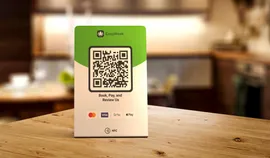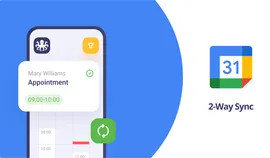From manual booking to digital efficiency
Customer bookings have transformed dramatically over the past few decades. From simple manual entries in appointment books to sophisticated digital platforms, these systems have evolved to meet the growing demands of the modern consumer. Initially, online booking was a convenience that set businesses apart; today, it is a necessity that ensures competitiveness and operational efficiency.
Booking systems are not just a convenience in the beauty and wellness industry but a game-changer. In an industry where customer satisfaction and experiences are paramount, these systems play a crucial role. They streamline the appointment process, enhance client engagement and retention, and offer personalized and flexible salon booking options. As the industry grows, the need for advanced booking solutions becomes even more critical.
We have collected recent online appointment software trends, their possible influence on the market, and scenarios for online booking businesses. This article will be handy for experienced entrepreneurs and beginners. Continue reading to discover how your business can lead the market using smart appointment software at full power.
The first online booking solution appeared in the mid-1990s, pioneered by companies such as OpenTable for restaurant reservations and Doctor’s Appointment Scheduler for medical appointments. This innovation significantly streamlined customer registration, reducing scheduling errors and no-shows while enhancing convenience for businesses and customers. Nowadays, booking apps are pretty common in any service business.
As of today, millions of companies globally use appointment software, with estimates suggesting that over 50% of service-based businesses have integrated such systems. This widespread adoption spans various industries, including healthcare, hospitality, sports, and beauty services, reflecting the software's critical role in modern business operations.
The cost of a CRM system with online booking typically ranges from $20 to $100 per month, depending on the software features. Some basic programs may cost less, while more advanced and customizable solutions can exceed this range.

Evolution of online booking platforms
Software for bookings has a short history. However, it has already encountered a few key points of change.
Early beginnings. The 1990s
The usage of online appointments began with the advent of the internet. Early adopters like OpenTable revolutionized restaurant reservations, while healthcare saw the emergence of tools like the Doctor’s Appointment Scheduler. These systems replaced manual scheduling with digital entries, reducing human error and making the customer interaction more accessible and efficient.
2000s. Expansion and innovation
The 2000s marked a period of rapid expansion and technological innovation. Online booking systems began diversifying across various fields. Key features such as real-time availability, automated reminders, and email confirmations became standard. Businesses started to recognize these systems' competitive advantage in simplifying the routine and increasing customer loyalty.
2010s. Integration and mobile accessibility
As smartphones became ubiquitous in the 2010s, online booking systems adapted to include mobile accessibility. This allowed customers to book appointments directly from their devices anytime, anywhere. Integration with other business tools, such as Customer Relationship Management (CRM) systems, payment gateways, and marketing automation platforms, became increasingly common. These integrations enabled businesses to manage their operations holistically, streamline processes, and gain deeper insights into customer behavior.
Present day. Advanced features and AI integration
Today, online booking systems are sophisticated platforms offering various advanced features. Artificial Intelligence (AI) and machine learning are pivotal in this evolution. AI-driven scheduling can predict optimal appointment times, manage cancellations, and personalize booking experiences based on customer preferences. Enhanced marketing management, robust data security measures, and comprehensive analytics tools are standard features, providing businesses and customers with a seamless and secure experience.

Booking systems in beauty and wellness
The beauty market is one of the fastest-growing ones because of innovative technologies that allow clients to receive even better service without effort. Online appointment software influences the beauty and wellness market in many ways. We have collected the main scenarios of the influence.
Improving customer satisfaction
Booking systems are crucial in the wellness and beauty industry, where customer satisfaction is paramount. These systems offer clients the comfort of booking appointments online anytime, fitting into their busy schedules. An easy-to-use interface and real-time availability allow clients to quickly find and book their preferred services without hassle, leading to higher satisfaction and loyalty.
Reducing no-shows and cancellations
One significant challenge in the beauty and wellness industry is managing no-shows and last-minute cancellations. Online customer management software mitigates this issue by sending automated reminders via email or SMS, prompting clients to confirm or reschedule their appointments. This protects business from missed appointments and allows businesses to fill vacant slots more effectively, maximizing their revenue potential.
Streamlining operations
Efficient booking systems help streamline day-to-day operations by automating administrative tasks such as appointment scheduling, rescheduling, and cancellations. This reduces the burden on staff, allowing them to focus more on providing quality services and less on managing schedules. Integration with other business tools, such as CRM and payment processing systems, enhances operational efficiency by creating a seamless workflow.
Enhancing marketing and customer engagement
Modern booking systems often have built-in marketing tools that help businesses engage with their clients more effectively. Features like automated follow-up emails, promotions, and personalized offers can be easily managed through these platforms. Additionally, the data collected from bookings can be used to understand client preferences and behaviors, enabling targeted marketing efforts that resonate with the audience.
Providing data-driven insights
Data analytics is a powerful feature of efficient booking systems. Businesses can make informed decisions about staffing, inventory, and marketing strategies by analyzing booking patterns, peak times, and popular services. This data-driven approach helps optimize resources, improve service offerings, and increase profitability.
Improving staff management
Efficient beauty salon software also plays a role in managing staff schedules. By aligning staff availability with client appointments, businesses can ensure they have the right number of staff on hand to meet demand without overstaffing. This improves staff productivity and morale and ensures clients receive timely and quality services.
Ensuring scalability and growth
As beauty businesses grow, their booking needs become more complex. Booking systems are scalable, allowing businesses to handle increased appointment volumes without compromising service quality. Whether expanding to multiple locations or adding new services, these systems can adapt to changing business needs, supporting sustainable growth.

Trends that will shape online booking
As we look toward the future, the evolution of online booking systems shows no signs of slowing down. Integrating emerging technologies and innovative features will transform the online booking landscape, particularly in the beauty and wellness industry. This section delves into the key trends poised to shape the future of online booking systems, offering insights into how these advancements can benefit businesses and enhance customer experiences.
AI-driven scheduling and personalization
Artificial Intelligence (AI) is becoming increasingly integral to online booking systems. AI-driven scheduling algorithms can predict optimal appointment times based on historical data, customer preferences, and staff availability. This leads to more efficient resource use and improved customer satisfaction.
Integration with IoT and wearable technology
The Internet of Things (IoT) and wearable technology are set to revolutionize online booking systems. These devices can collect real-time customer preferences and behavior data, allowing for more accurate and personalized service offerings. For instance, a smartwatch could monitor a client’s stress levels and automatically book a massage appointment.
Enhanced user experience with voice and visual interfaces
Voice-activated booking and visual interfaces are emerging as significant trends in online booking systems. Voice assistants like Alexa and Google Assistant can facilitate hands-free booking, making the process even more convenient for clients. Visual interfaces, including virtual reality (VR) previews of services, can provide clients with a more immersive booking experience.
Data security and privacy measures
As online booking systems handle increasing amounts of sensitive customer data, robust security measures will become even more critical. Future systems will prioritize enhanced encryption, compliance with global data protection regulations, and transparent data usage policies. Businesses must invest in advanced cybersecurity solutions to protect customer information and maintain trust.
Comprehensive analytics and reporting
Data analytics will play a crucial role in the future of online booking systems. Advanced analytics tools will give businesses detailed insights into booking patterns, customer behaviors, and service performance. These insights can inform strategic decisions, such as optimizing staff schedules, identifying peak service times, and tailoring marketing efforts.
Seamless integration with other business tools
Future online booking systems will seamlessly integrate various business tools, including CRM systems, marketing automation platforms, and payment gateways. This integration will create a unified workflow, allowing businesses to manage all operations from a single platform.
Increased adoption of mobile and cloud-based solutions
The adoption of mobile and cloud-based booking solutions is set to rise, driven by the need for flexibility and accessibility. Mobile booking apps will enable clients to manage their appointments on the go, while cloud-based systems will offer businesses the scalability and security needed to handle growing customer bases.

Future of online bookings: how to benefit
Booking technologies have become essential in today's competitive market, where consumer expectations for convenience and seamless service are higher than ever. By automating scheduling, reducing no-shows, and integrating various tools, online booking systems systematically shifted the way we look at business processes.
Online scheduling automates administrative tasks, giving office staff more time to spend with clients — thereby enhancing a client's in-person experience.
Forbes
Looking to the future, several trends will continue to shape the evolution of booking software. AI-driven scheduling and personalization, integration with IoT and wearable technology, and the adoption of voice and visual interfaces are set to redefine how appointments are managed. Enhanced data security, comprehensive analytics, and integration with other business systems will optimize operations and improve customer experiences.
By understanding and adopting the latest advancements in online booking systems, businesses can remain at the forefront of industry developments. The future of online booking holds immense potential, offering exciting opportunities for those ready to embrace new technologies and strategies. The journey towards a more efficient, customer-centric booking process is ongoing, and businesses that adapt to these trends will be well-positioned to thrive in the evolving marketplace. Try EasyWeek appointment software and benefit from future innovations as fast as possible.











